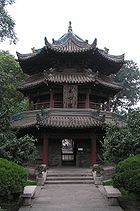
Gedimu
Encyclopedia

Hanafi
The Hanafi school is one of the four Madhhab in jurisprudence within Sunni Islam. The Hanafi madhhab is named after the Persian scholar Abu Hanifa an-Nu‘man ibn Thābit , a Tabi‘i whose legal views were preserved primarily by his two most important disciples, Abu Yusuf and Muhammad al-Shaybani...
, non-Sufi school of the Sunni tradition. Its supporters are centered around local mosques, which function as relatively independent units.
It is numerically the largest Islamic school of thought in China and with the Hui
Hui people
The Hui people are an ethnic group in China, defined as Chinese speaking people descended from foreign Muslims. They are typically distinguished by their practice of Islam, however some also practice other religions, and many are direct descendants of Silk Road travelers.In modern People's...
, Dongxiang
Dongxiang
Dongxiang may refer to:*China Dongxiang, a sportswear company in China*Dongxiang language, a Mongolic language*Dongxiang people, an ethnic group of China who speak the Dongxiang language*Dongxiang Autonomous County in Gansu, China...
, Salar, Bonan
Bonan
The Bonan people are an ethnic group living in Gansu and Qinghai provinces in northwestern China...
, the most common school tradition of Islam.
Since the introduction of Islam, first during the Tang Dynasty
Tang Dynasty
The Tang Dynasty was an imperial dynasty of China preceded by the Sui Dynasty and followed by the Five Dynasties and Ten Kingdoms Period. It was founded by the Li family, who seized power during the decline and collapse of the Sui Empire...
in China, it continued to the Ming Dynasty with no splits. At the end of the Ming and early Qing Dynasty
Qing Dynasty
The Qing Dynasty was the last dynasty of China, ruling from 1644 to 1912 with a brief, abortive restoration in 1917. It was preceded by the Ming Dynasty and followed by the Republic of China....
Sufism
Sufism
Sufism or ' is defined by its adherents as the inner, mystical dimension of Islam. A practitioner of this tradition is generally known as a '...
was introduced to China. Especially people in Xinjiang
Xinjiang
Xinjiang is an autonomous region of the People's Republic of China. It is the largest Chinese administrative division and spans over 1.6 million km2...
, Gansu and Qinghai began to convert to the sufi sects and the new directions were referred to as old teaching / New Faith / New Religion (Chinese xinpai or Xinjiao). Those who clung to the old beliefs were called members of the Gedimu or Laojiao (the old doctrine / of the old faith, the Old Religion).
In the religious ideas of this school the basic Islamic principles of Tawheed are maintained. In religious practice, this requires of the faithful a strict observance of the principle of Rukun, the five basic duties of Islam.
In the long period of development formed a conservative tradition. It is against unorthodox innovations and sticks to the old rules, without interference in the affairs of other denominations.
Another important feature of the school is that it puts a focus on culture and education. Organised by the mosques, they send the children from their neighborhood to receive religious instruction. Usually Arabic and Persian writings are studied.
Qadim has spread the longest history in China. In its development, the school has been influenced by Chinese culture and has many Han Chinese
Han Chinese
Han Chinese are an ethnic group native to China and are the largest single ethnic group in the world.Han Chinese constitute about 92% of the population of the People's Republic of China , 98% of the population of the Republic of China , 78% of the population of Singapore, and about 20% of the...
customs and traditions included in its rites. [5] The mosque architecture is different from that of other Muslim areas. Qadim was the result of the Sunni faith in a particular environment in the Chinese hinterland.
Jingtang Jiaoyu
Jingtang Jiaoyu
Jingtang Jiaoyu literally meaning "scripture hall education", refers to a form of Islamic education developed in China or the method of teaching it, which is the practice of using Chinese characters to represent the Arabic language.-Islamic Education:...
is a form of Islamic education, heavily influenced by Chinese culture, which the Gedimu muslims pride themselves in learning. Jingtang Jiaoyu has been severely criticized for prounouncing Arabic incorrectly. Due to the liminations of Chinese characters, it propagates wrong pronunciation in Arabic. Many Hui who used it said Salaam Aleikun instead of Salaam Alaikum.
The Hanafi Sunni Gedimu cling fiercely to Chinese customs and the Jingtang Jiaoyu method of education, refusing to pronounce Arabic in the Arab manner even when learning of the standard pronunciation. Hanfi Sunni Sunnaiti's (Yihewani adherents) criticize the Gedimu for practicing Islamic customs influenced by Chinese culture, including Jingtang Jiaoyu, Sunnaiti's pride themselves on speaking correct Arabic, accusing the Gedimu muslims of practicing Han and Buddhist customs and "Chinese Arabic". One Sunnaiti Imam said of the Gedimu, "blindly followed the traditions of their ancestors".
Qadim along with the Ikhwan and Xidaotang
Xidaotang
Xidaotang is a Chinese-Islamic school of thought. It was founded by Ma Qixi , a Chinese Muslim from Lintan in Gansu, at the beginning of the 20th Century...
on the three major school traditions of China
Literature
- Hu Fan: Islam in Shaanxi: Past and Present. Diss. Bonn 2008
- Shoujiang Mi, Jia You: Islam in China (web)
- Thomas Heber: "Islam: A new conflict in China? Growing ethnicity-Islamization-separatism" Yearbook of the public law,the present. N.F.,45.1997, S.645 ff.
- Mikko Suutarinen: The Dongxiang People of Gansu - Ethnic, Religious and Local Identities (Religious Identity) (PDF-Datei; 320 kB)
- Jonathan Newman Lipman: Familiar Strangers, a history of Muslims in Northwest China, Seattle, WA: University of Washington Press 1997, ISBN 0-295-97644-6

